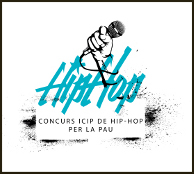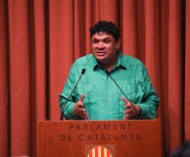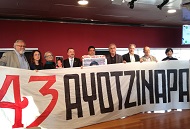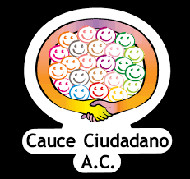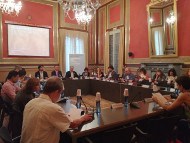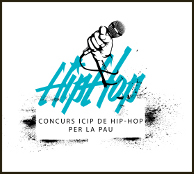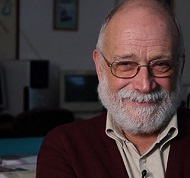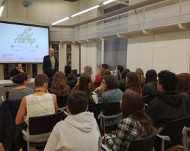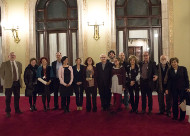After evaluating all of the entries submitted, the jury of the third edition of the ICIP Hip-Hop for Peace Contest, corresponding to 2018, has announced the winners. This competition aims to promote creativity and give visibility to the commitment of young people in the field of peace culture. In this third edition, the award-winning entries address very current issues such as the refugee crisis, the defense of feminism and the denunciation of violence against women. There were also messages defending respect, equal opportunity, social inclusion and non-discrimination because of race or sexual orientation.
In Category 1, aimed at students in secondary school, senior high school and vocational training school in Catalonia, the winning video clips are:
Salgamos de esta celda (Let’s leave this cell), a video clip created by “Las fugitivas del silencio,” made up of students from Manuel Vázquez Montalbán Secondary School in Sant Adrià del Besòs (Barcelonès), who have won the possibility of recording in a professional studio. The piece launches a message of solidarity with refugees, especially women.
You say you feel sorry for refugees
Yet in the street you glare at them
(…) All of this, as a woman, is even more complicated
Traveling for their future, with children or while pregnant
Without any protection, at risk of being abused
¡Basta! (Enough!), a video clip created by students from Vilanova del Vallès (Vallès Oriental) Secondary School, winners of a hip-hop workshop. This is a piece denouncing the abuse of women and is based on the “No means no” slogan.
If women say no means no
No, no no! Respect!
Tots som iguals (We are all equal), a video clip created by young people from L’Àngel Special Education Center, in Amposta (Montsià), awarded a special mention. In this case, the piece calls for social inclusion, equal opportunity and respect for people with special needs.
There is only one race, the human race
We are all brothers, even if we don’t share the same blood
The only disability is not realizing that we are all equal
In Category 2, aimed at young people between the ages of 12 and 25 who participate in youth, cultural, civic or socio-educational action centers in Catalonia, the winners are:
Infame, caprichosa y estúpida (Despicable, capricious and stupid), a video clip created by young people from the Vitamina project of the Carta de la Pau Foundation, winners of a recording in a professional studio. The video clip also touches on the subject of solidarity with refugees fleeing military conflicts and calls for the free movement of people.
No one chose place of birth
I am lucky not to be hungry
(…) Closing borders is an act that hurts us
We become prisoners of an imaginary line
Diversitats (Diversities), a video clip created by young people from the Torre Bassas Youth Center in Rubí (Vallès Occidental), winners of a hip-hop workshop. This piece aims to denounce prejudice and discrimination, with a particular emphasis also on gender violence.
I respect your sexuality and your way of thinking
Open your mind so that you can move forward
(…) You judge people unnecessarily
Without knowing what they think or what they do
Reflejos (Reflexes/Reflections), a video clip created by a group of young people in work-linked training at Càritas-Girona, winners of a special mention. In this case, the piece is a cry against racism that denounces, in first person, the discrimination that young people experience.
We want to study, we want to move forward
Nowhere do they let us in
We walk down the street while people glare
Because they think, without looking, that we are terrible
The award-winning groups will be honored at an institutional event that will take place at 12 noon on Thursday 28 February at the ICIP offices (Tapineria, 10, 1st floor, Barcelona). Participants in the event include ICIP president Xavier Masllorens and the head of the Catalan Youth Agency, Cesc Poch. The event is closed to the public and attendance is by invitation only.
The ICIP Hip-Hop for Peace Contest, which has reached its third edition, aims to give visibility to the commitment and creativity of young people in the field of peace culture. The event is organized in conjunction with the Department of Education and the Directorate-General for Youth of the Generalitat of Catalonia. A total of sixteen video clips were submitted in this third edition.
Category: Uncategorized
Coalition of Families of the Disappeared in Algeria, ICIP Peace in Progress Award 2019
The Coalition of Families of the Disappeared in Algeria (CDFA) was created in Paris in May 1998 by a group of mothers of disappeared persons in Algeria in order to raise national and international awareness about the cases of enforced disappearances that took place during the Algerian Civil War in the 1990s. That same year the association organized a demonstration in front of the National Observatory of Human Rights in Algiers which, since then, has become a weekly event.
Since its establishment, CFDA has coordinated the movement of the mothers of the disappeared and has promoted the creation of various committees throughout France, including SOS Disparu(e)s. The group is currently the only organization that offers assistance and support to relatives of disappeared persons in Algeria, despite the lack of institutional recognition in the country. The organization strives to achieve a peaceful and democratic transition in Algeria with the establishment of a process for truth, justice and reparation and for the full observance of fundamental human rights and freedoms.
The activity of CFDA and SOS Disparu(e)s includes the production of more than 5,400 dossiers with information related to disappeared persons. As a result of this work, the organization reported around 5,000 cases to the United Nations Working Group on Enforced or Involuntary Disappearances. CFDA is a member of the Euro-Mediterranean Federation Against Enforced Disappearances and has observer status in the African Commission on Human and Peoples’ Rights.
The ICIP ceremony award took place on Monday 21st September, International Day of Peace, at the Parliament of Catalonia. The ceremony was presided over by the president of Parliament, Roger Torrent; and ICIP president Xavier Masllorens.
ICIP grants the Peace in Progress Award to Cauce Ciudadano for its work in the prevention of violence and the building of peace in Mexico
The International Catalan Institute for Peace (ICIP) presented the ICIP Peace in Progress Award 2018 to the Mexican organization Cauce Ciudadano in a ceremony that took place in the Parliament of Catalonia on the evening of Tuesday 12 March. The event was attended by representatives of institutions and organizations dedicated to the promotion of peace and linked to Mexico and Latin America in general. Cauce Ciudadano, an organization founded in 2000 by young people who had been pandilleros (members of criminal gangs) has been awarded “for its work in the prevention of violence and the construction of peaceful alternatives for youth in settings characterized by crime, especially drug trafficking.”
The ceremony was presided over by the president of Parliament, Roger Torrent; the Minister for Foreign Action, Institutional Relations and Transparency, Alfred Bosch; and ICIP president Xavier Masllorens. Masllorens began his speech by expressing “dismay at the democratic decline being experienced in various places in the world, including Spain, and concern for every person who accepts cutbacks in rights and freedoms in the name of security.” He praised the work of Cauce Ciudadano for “providing a preventive and positive response to violence, as opposed to the repressive and securitizing measures of public authorities.”
A video on the history of Cauce Ciudadano was screened during the event and the Colombian journalist and writer Laura Restrepo, author of the commentary, highlighted “the organization’s commitment to peace and reconciliation, moral and civic education, reconciliation between the parties in conflict, reparation for damages, non-repetition and respect for the memory of victims.”
In her award acceptance speech the director of Cauce Ciudadano, Erika Llanos, popular educator and the first female member of the organization who is not a former pandillera, expressed her gratitude for the award and highlighted the commitment of Cauce Ciudadano to “transform fear and re-humanize daily life,” with its work both in schools and in prisons, and “to speak with those involved in crime and bring together victims and victimizers,” with a special emphasis on the fight for gender equality and the recognition of women. For his part, the founder of the organization, Carlos Cruz, in a moving speech, defended “a narrative of justice and peace beyond security” to reverse the climate of violence and crime in Mexico, and the need to “listen and love” to build peace and to organize at the social level to create “peace economies.” Cruz also dedicated a few words to Catalan politicians in prison and in exile, expressing his desire for their return home, the same desire he has for the thousands of disappeared people in Mexico.
In the closing ceremony, the Minister for Foreign Action, Alfred Bosch, defended dialogue and justice to build peace and he highlighted the work of Cauce Ciudadano to “make the world a better place.” The president of Parliament, Roger Torrent, evoked the memory of the politicians in prison and in exile, especially Carme Forcadell and the conseller Raül Romeva, “a woman and a man of peace, builders of peace, accused of violent uprisings that never happened.” Torrent recalled that “peace is not just an absence of violent attitudes; peace is built against repression, impositions and threats.”
Previously granted
The first edition of the award in 2011 recognized the struggle of conscientious objectors and “insubmisos” (people who refuse to do military service or any substitute social work) represented by Pepe Beúnza, the first conscientious objector to compulsory military service for ideological reasons in Spain. The same year, in an extraordinary edition of the award, the Parliament of Catalonia was honored for representing the continuity and legacy of the institutions “Pau i Treva” and “Consolat de Mar.”
Then, in 2012, the ICIP Award was granted to five Madres de Soacha (Mothers of Soacha) for their work in favor of peace and human rights in Colombia. The next year the award was granted to the ex-general born in Belgrade, Jovan Divjak, for his courage in the defense of Sarajevo during the Balkans War and his work in favor of the victims of that conflict.
In 2014, honored the Women’s International League for Peace and Freedom (WILPF) for its century-long involvement in the work of women for peace, while in 2015 was granted to the Capuchin friar Joan Botam, promoter of numerous initiatives linked to peace and ecumenism.
In 2016, the ICIP Peace in Progress Award recognized the work carried out by Peace Brigades International in the support and accompaniment of human rights defenders.
In the last edition of the award, in 2017, the ICIP recognized the activist Arcadi Oliveres, for his commitment and tireless dedication to the promotion of peace, social justice and human rights.
Retrieve the videos of the International Forum on Peacebuilding in Mexico
On 25, 26 and 27 September, ICIP organized the First International Forum on Peacebuilding in Mexico together with Taula per Mèxic and the Mexican organization Serapaz. The event brought together forty speakers and more than a hundred attendees from the academic and cultural worlds, social activism, institutions and journalism. Three days of discussions about the opportunities and glimmers of hope that have recently emerged in Mexico to advance in peacebuilding, in a country with extremely high rates of violence: homicides, extortions, kidnappings, enforced disappearances and numerous human rights violations.
A number of experts participated in the Forum in order to address the current challenges that Mexico faces in various areas: from security, migration analysis, struggles for the defense of land and territory, the situation regarding freedom of the press and the need to make progress in the areas of truth, justice and reparation for victims.
The celebration of the Forum coincided with the fifth anniversary of the disappearance of 43 students in Ayotzinapa, in Iguala, an emblematic case of impunity, corruption and the lack of truth and justice that exists in the country. The father of one of the young students, Epifanio Álvarez, participated in the conference, bringing Barcelona his struggle and that of the thousands of families with relatives who have disappeared. Also participating was Yolanda Álvarez, mother of a person who disappeared in 2008 at the hands of the military and present director of Colectivo Búscame, an organization for relatives of disappeared persons.
The opening session of the Forum, on Wednesday, 25 September, was attended by the Minister of Foreign Affairs, Alfred Bosch, the general director of Cooperation, Manel Vila, the Deputy Mayor of Barcelona, Laura Pérez Castaño, along with representatives of ICIP, Taula per Mèxic and Serapaz.
Videos of the Forum sessions are available on the ICIP YouTube channel.
Speakers participating in the Forum include representatives of the Collective for the Analysis of Security with Democracy (CASEDE), CIDOB, the Oaxaca Consortium for Parliamentary Dialogue, El Colegio de la Frontera Norte, Service for Peace and Justice (SERPAJ), the Center for Research and Advanced Studies in Social Anthropology (CIESAS), the Mexican Commission for the Defense and Promotion of Human Rights, the Institute for Integrated Transitions, the Kellogg Institute for International Studies at the University of Notre Dame and the Human Rights Institute of Catalonia.
The Government of Catalonia, the Barcelona City Council and Casa Amèrica Catalunya collaborated in the organization of the Forum.
The event is part of the ICIP work program “Violence outside the context of war.”
Coinciding with the celebration of the Forum, ICIP has published the monograph “Mexico: tracing opportunities for peace” in the Peace in Progress journal. It is available in English, Catalan and Spanish.
Cauce Ciudadano, ICIP Peace in Progress Award 2018
Cauce Ciudadano is an organization founded in 2000 by young former gang members, with the goal of offering comprehensive support and opportunities to other teens that experience and/or generate violence in settings characterized by social exclusion and a strong presence of drug trafficking and criminal groups.
The organization focuses on socio-educational and socio-community work in schools, public spaces, juvenile detention facilities and penitentiaries, with the aim of training young people as agents of social change. Since its inception, the organization has assisted 230,000 people and, in a country like Mexico, characterized by the war on drugs, Cauce Ciudadano has designed a model for the prevention of violence from a human rights perspective, with an emphasis on health promotion, attention to the damage caused and rehabilitation.
The ICIP Award ceremony took place on Tuesday 12 March at the Parliament of Catalonia. The ceremony was presided over by the president of Parliament, Roger Torrent; the Minister for Foreign Action, Institutional Relations and Transparency, Alfred Bosch; and ICIP president Xavier Masllorens.
How to tackle violence outside of armed conflict settings
On Thursday 13 September, ICIP held the seminar “How to tackle violence outside of armed conflict settings” at the Palau Centelles in Barcelona. The seminar brought together experts in the violence affecting various countries in Latin America, a region where 40% of the homicides registered worldwide occur. This violence is linked to common problems such as organized crime, drug trafficking, gangs, corruption, inequality and poverty.
After ICIP president Xavier Masllorens’ welcoming remarks, the initial reflection was given by Ivan Briscoe, director of the Latin American and Caribbean program of the International Crisis Group. In his comments he established connections between the political violence and the criminal violence affecting the region, which “are not isolated phenomena,” and he reflected on the new types of extremely cruel and selective violence aimed at political and social leaders, which states need to know how to tackle.
The following speeches were given by Jessica Cohen, an international security analyst, Katherine Aguirre (Igarapé Institute of Brazil), Raquel Willadino (Observatório de Favelas of Brazil), Carles Feixa (Pompeu Fabra University), David Bondia (Human Rights Institute of Catalonia), Marc Bosch (Doctors Without Borders), and Gisela Cardús (Catalan Refugee Aid Commission).
The different speakers highlighted the need to address the structural causes of violence (such as inequalities, social exclusion and a lack of opportunities); the need to establish more coordination at the local, national and regional levels; to study the violence from a multidisciplinary approach; and to search for individual responses for each type of violence based on strategies of prevention and conflict transformation which go beyond current militarization policies. As a matter of fact, regarding positive strategies, a special mention was made of the cases of cities such as Ciudad Juárez (Mexico), San Pedro Sula (Honduras) and Medellín (Colombia), which for years registered the highest rates of violence and which have undergone a progressive reduction in the number of violent deaths. A reflection was also made regarding the need to respond to violence within a framework of respect for and compliance with human rights. The conference also addressed direct consequences of violence, such as population displacement and demands for asylum or humanitarian action.
Oscar Mateos, the director of the ICIP program “Violence outside of armed conflict settings,” mentioned as final conclusions the need to study strategies for the prevention of violence and for social transformation in order to be able to offer life projects in very precarious contexts, and to build emancipating and liberating peace models, which prevent violence from becoming a routine phenomenon, as an alternative to securitized peace models. He warned of the inability of states to respond to this violence and of the need to place value on sub-state actors and the creative and hopeful power of civil society.
During the seminar, a minute of silence was observed in memory of Vicent Martínez Guzmán, former vice president of ICIP, and Anna Bastida, a former member of the ICIP Governing Board. With their academic and personal expertise, these two people worked notably in the field of peacebuilding and the promotion of peace.
Students of Lauro High School and the Garraf Youth Office win the second edition of the Hip-Hop for Peace Contest
The jury of the second edition of the ICIP Hip-Hop for Peace Contest has announced the winners after viewing all of the entries submitted.
Category 1 (Middle school, high school and vocational school students):
– First prize for the students of Lauro High School, in Les Franqueses del Vallès, for the video “Requiem for a Dream”.
– Second prize for the students of Hug Roger III High School for the video “Res a dir, molt per criticar” (Nothing to say; A lot to criticize).
– El Til·ler School received an honorable mention for the video “El Rap dels Til·ler” (Til·ler Rap), for praising diversity and working on group cohesion.
Category 2 (Young people between the ages of 12 and 25 from various institutions)
– First prize for the Garraf Youth Office for the video “Gritando al mundo” (Shouting at the world).
– Second prize for the Servei Gironí de Pedagogia Foundation for the video “¿De qué lado estás?” (Whose side are you on?).
– The Alt Empordà County Council received an honorary mention for the video “Barreras Cutáneas” (Skin barriers), for its quality and technical excellence.
The awards ceremony will take place on Friday 13 April at 12:00 noon at the ICIP office. The awards consist of a masterclass given by a hip-hop professional and the recording of the winning entry at a professional recording studio.
The ICIP Hip-Hop for Peace Contest aims to give visibility to the commitment and creativity of young people in the field of peace culture. The event is supported by the Department of Education and the Directorate-General for Youth of the Generalitat of Catalonia.
Arcadi Oliveres, Winner of the 2017 ICIP Peace in Progress Award
The 2017 ICIP Peace in Progress Award recognizes Arcadi Oliveres for “his tireless dedication and commitment in the promotion of peace, social justice, human rights and disarmament, from a universal perspective”.
Linked since his young years to the scouting movement, the Christian movement Pax Christi and to the Víctor Seix Institute for Polemology, he received his first influences towards pacifist thought from Frederic Roda and Joan Botam. During the period of the Francoist dictatorship, his commitment to democracy led him to join the Assemblea de Catalunya (‘Assembly of Catalonia’), from where he started promoting the Marxa de la Llibertat (‘Freedom March’) in 1976, claiming “Freedom, Amnesty and Statute of Autonomy”.
In 1982, he joined Justícia i Pau (‘Justice and Peace’), organisation he ends up presiding and from where he boosts the first campaign for 0.7% of development aid for Third World countries. All along his trajectory, his determined activism took him to participating in campaigns of the anti-NATO movement, against arms trade, in favour of conscientious objection against compulsory military service and tax resistance, against the external debts of poor countries and against war. In his side, dedicated to global justice, he also was a fierce defender of immigrant regularisation, he was linked to the anti-globalisation movement and to the 15M protests in Catalonia.
The award ceremony took place on Tuesday, April 17, at the Parliament of Catalonia.
Students from Les Franqueses and young people from Fedelatina win the Hip Hop for Peace Contest
Coinciding with the School Day of Nonviolence and Peace (DENIP), observed today, 30 January, ICIP has announced the winners of the First Hip Hop for Peace Contest. This contest is aimed at young people and students of Catalonia, between 12 and 25 years of age, with the aim of promoting a culture of peace.
The video “STOP WARS,” created by a group of students aged between 15 and 18 from Lauro High School in Les Franqueses del Vallès, won the award in Category 1, for secondary school, vocational school and high school students of Catalonia. The video is a denunciation of inaction in the face of injustice, and a call for action.
The video “NO LA MALTRATES” (DON’T ABUSE HER), by a group of young people between the ages of 19 and 23 associated with the Fedelatina organization, won the award in Category 2, for socio-educational, cultural, youth and civic centers and institutions. In this case, the video denounces gender violence and calls for the empowerment of women.
In addition, the jury awarded a special mention to “TODOS SOMOS IGUALES” (WE ARE ALL EQUAL), by students from the Manyanet School in Molins de Rei, and “LLUITA CONTÍNUA” (CONTINUOUS STRUGGLE), by Lluís de Peguera High School in Manresa (Category 1); and “RAP CONTRA LA DISCRIMINACIÓ” (RAP AGAINST DISCRIMINATION), by the Martí Codolar Youth Center in Barcelona, and “SALT ÉS MY CITY” (SALT IS MY CITY), by Fàbrica Jove in Salt (Category 2).
A total of 24 videos, corresponding to 11 organizations and/or schools in Catalonia, were submitted to the competition, which is supported by the Department of Education and the Directorate-General for Youth of the Generalitat of Catalonia. The jury was made up of Cécile Barbeito, a member of the ICIP Governing Board; music critic Sandra Tello; Antoni López, representing the Department of Education; Thais Nieto, representing the Directorate-General for Youth; Isabel Ribera, an expert in the field of education; and Miquel Casas, an ICIP specialist.
Awards ceremony
The awards ceremony for the First ICIP Hip Hop for Peace Contest will take place on Monday, 13 February, at 11:30 am, at the ICIP Library (Tapineria, 10, 1st floor, Barcelona).
The awards consist of a masterclass given by workshop conductor and activist Pau Llonch (for the winners in Category 1) and a recording at “La Conga Music” professional recording studio in Sabadell (for the winners in Category 2).
ICIP confers Peace in Progress Award on Peace Brigades International
The International Catalan Institute for Peace (ICIP) presented the 2016 Peace in Progress Award to the NGO Peace Brigades International (PBI) for their work in the support and accompaniment of human rights defenders. The event took place in the Parliament of Catalonia on Tuesday 7 February and was attended by approximately one hundred people.
The ceremony was chaired by the President of Parliament, Carme Forcadell, and ICIP president Xavier Masllorens. On the part of the award-winning organization, the representative of PBI Spain, Montserrat García, picked up the award, while the commentary was given by the historic human rights activist and current Member of Congress in Guatemala, Nineth Montenegro.
ICIP president Xavier Masllorens justified recognition for PBI because “standing by those whose most fundamental rights are violated, and who risk their lives and safety, accompanying them, is at the very heart of the ethic of care that we promote from the institutions that work for peace.”
The importance of the work carried out by Peace Brigades International was made clear with the emotional testimony of human rights activist Nineth Montenegro, founder of the Mutual Support Group (GAM), an organization formed by relatives of the disappeared in Guatemala, who was supported and protected by PBI in the 1980s after she denounced the abduction and disappearance of her husband: “Neither my daughter nor I would be alive if it were not for the commendable, selfless and self-sacrificing work of members of the Brigades. […] They gave me the opportunity to stand up today in Guatemala and keep fighting for a better country.”
During the ceremony a video about Peace Brigades International was shown, and then Professor Antoni Pigrau, member of the ICIP Governing Board, read the conferment statement. The award was presented to the international representative of PBI Spain, Montserrat García, who dedicated it to all human rights defenders, “with the hope that it will contribute to make the important work they do more visible, and for which they face threats, attacks and persecution.” In her speech, García regretted that “unfortunately, the world remains a dangerous place to defend human rights and the need for international support is growing.” The international representative of PBI also highlighted “the hundreds of volunteers” who have been members of PBI teams and who are one of the “fundamental pillars” of the organization.
In the closing ceremony, the President of Parliament, Carme Forcadell, congratulated the International Brigades and stated that they were a “necessary model” because “we need to have examples that reinforce the culture of peace in our society.” Forcadell said that “peace is much more than the absence of violence,” because “there can be no peace without respect for human rights and dignity. There is no peace without freedom and justice.”
Inspired by Gandhi’s nonviolent techniques, Peace Brigades International was founded in 1981 with the conviction that the presence of international volunteers could deter attacks against the civilian population in conflict areas. Thus, for 35 years, they have been working in conflict areas, where their volunteers provide support to human rights activists and other groups and organizations that are threatened, such as unions or indigenous communities. They currently have permanent teams in Guatemala, Colombia, Mexico, Honduras, Nepal, Indonesia and Kenya, and they have also worked in Sri Lanka, the Balkans, El Salvador, Haiti and East Timor.
The ICIP Peace in Progress Award is granted annually and consists of public recognition, a sculpture created by Nobel Peace Prize winner, activist and artist Adolfo Pérez Esquivel, called Porta del Sol, and a financial prize of 4,000 euros.
Full video of the ceremony (Canal Parlament)
Peace Brigades International, ICIP Peace in Progress Award 2016
The 2016 ICIP Peace in Progress Award recognizes the non-governmental organization Peace Brigades International (PBI) “for its long history of protecting human rights defenders who work in areas of repression and conflict”.
Peace Brigades International was created in 1981 by a group of activists inspired by Gandhi’s nonviolent tactics. They were convinced that international accompaniment could deter attacks against the civilian population in conflict areas. Over the last 35 years, the organization has developed activities to support local human rights defenders, including protection and accompaniment, safety training, advocacy workshops and workshops on rebuilding social fabric.
The award ceremony took place on Tuesday, February 7, at the Parliament of Catalonia. On the part of the award-winning organization, the representative of PBI Spain, Montserrat García, picked up the award, while the commentary was given by the historic human rights activist and current Member of Congress in Guatemala, Nineth Montenegro.
The ICIP Peace in Progress Award is granted by agreement of the Governing Board of ICIP and consists of public recognition, a sculpture created by the Nobel Peace Prize winner, artist and activist Adolfo Pérez Esquivel, called Porta del Sol, and a financial prize of 4,000 euros. The award is presented at an institutional award ceremony which takes place annually at the Catalan Parliament.
Joan Botam, 2015 ICIP Award
Catalan priest and Capuchin friar Joan Botam received the 2015 ICIP Peace in Progress Award at a ceremony that took place at the Parliament of Catalonia on April 12. Botam is a promoter of numerous initiatives linked to peace and ecumenism; he is one of the most important figures who introduced pacifism to Catalonia and a strong advocate of religion as a source of peace and dialogue.
Joan Botam (Les Borges Blanques, 1926) holds a doctorate in theology and is the founder of both the Víctor Seix Polemology Institute and the Ecumenical Center of Catalonia, of which he is currently president. His career linked to the pacifist movement begins in 1955, when he becomes chaplain of the religious movement Pax Christi. In 1963 he is elected vicar provincial of the Capuchins of Sarrià and, as such, he plays a key role in the events of the Caputxinada, the sit-in of students, intellectuals and artists in the Capuchin Convent in 1966. His intervention as vicar provincial was decisive in preventing the arrest of the demonstrators. More recently, Joan Botam represented Barcelona in the United Nations Millennium Summit of religious and spiritual leaders (2000) and was presented with the Creu de Sant Jordi Award (2010) for his contribution to interreligious dialogue and the promotion of peace, coexistence and understanding between cultures.

